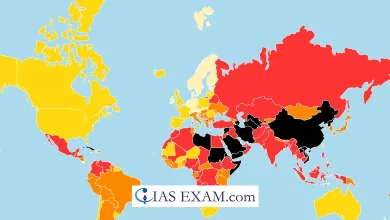Sugary Processed Foods: Why They’re Harmful
Syllabus: Health [GS Paper-2]

Context
In recent times, there has been increased attention on the high sugar content in flavoured malt-based milk powders and baby food. Government authorities are cautioning against labelling such items as “healthy” due to concerns over misleading promotion and high sugar levels.
Misleading Health Claims
- Examining Sugar Content in “Health” Drinks:
-
-
- Studies on sugar content show the high amount of added sugars in the most sold malt-based beverages such Bournvita where the major portion of carbohydrate is sugar added.
- Malt production, which is a part of the malting process, itself increases sucrose content due to the intrinsic maltose formed during germination and the additional contribution from maltodextrin and liquid glucose.
-
- FSSAI’s Stance on Sugar Content:
-
- The Food Safety and Standards Authority of India (FSSAI) have put forward requirements for products that have labels as “low on sugar”. They should have a total sugar content which is less compared to 5g per 100g.
- Research has shown that excessive consumption of sugary drinks leads to intake of daily calorie requirements, which creates risk of diabetes and obesity. This problem becomes more dangerous if these drinks are advertised as health drinks as they can surpass one’s daily sugar intake recommendations very easily.
Baby Food Controversy
- Sugar in Infant Nutrition:
-
- Study of baby food products, such as Nestle’s Cerelac, indicates an alarming sugar content and it begs a question how much sugar babies in their early stages should consume.
- Ingredients such as maltodextrin that enhances the taste and texture have also been proven to increase the glycemic index, which again can lead to health issues such as fatty liver and can cause insulin resistance.
- FSSAI Regulations and Enforcement:
-
- Although FSSAI standards limit the sugar quantity in the feeding foods for infants, their supervision, and surveillance were key weaknesses that need to be addressed.
- Despite the restrictions, marketing activities using social media and influencers predominantly the products with high sugar saturation, striving in this context for more aggressive regulations.
Why Sugary Processed Foods are Harmful
- High Sugar Content: Sugary processed foods contain added sugars that exceed the daily recommended intake. Consuming high amounts of sugar leads to a rapid spike in blood sugar levels, causing an insulin surge and inflammation in the body.
- Lack of Essential Nutrients: Processed foods are often stripped of essential nutrients, fibre, and antioxidants during manufacturing. This leaves consumers with a feeling of fullness but lacking in vital nutrients.
- Unhealthy Fats and Oils: Many processed foods contain unhealthy fats and oils, such as trans fats and omega-6 fatty acids, which can lead to inflammation and heart disease.
- Artificial Additives and Preservatives: Sugary processed foods often contain artificial additives and preservatives, such as monosodium glutamate (MSG), aspartame, and sodium nitrate, which have been linked to various health problems.
- Impact on Gut Health: Only the consumption of sugary foods made through artificial methods can disrupt the equilibrium of gut bacteria and which manifest as digestive problems, inflammation and weaken the immune system.
- Contribution to Chronic Diseases: The studies show that the frequent consumption of sugar-rich, processed foods is one of the main reasons why the rate of chronic sickness, especially obesity, type 2 diabetes, heart disease and certain types of cancer are increasing.
- Negative Impact on Mental Health: On the other hand, diets high in sugary foods have been linked to hypersomnolence, depression, anxiety, and other mental health problems.
- Lack of Satiety: Moderation and the restriction of sugary processed foods are usually only a physiological reaction towards their highly palatable design, which is aimed to stimulate overconsumption and so-called addiction.
- Supports Unhealthy Eating Habits: Sustaining long term on a diet in the form of sweet processed foods can introduce malicious eating habits, which eventually makes it difficult to adopt healthier living.
- Negative Impact on Children’s Health: Consuming high levels of sugar present in processed foods at an early age could actually result in several developmental problems, obesity and daily bad eating which might be unhealthy for life.
Conclusion
The recent focus on sugar content in flavoured milk powders and baby food underscores the urgent need for stricter regulations and enforcement. By addressing misleading health claims and revising existing regulations, authorities can promote healthier dietary choices and protect consumers, especially vulnerable populations like infants and young children, from the adverse effects of excessive sugar consumption.
Source: The Hindu
Also Read: E- commerce drop health Tag for Beverages brand
UPSC Mains Practice Question
Q. Examine the health implications of consuming sugary processed foods and discuss the factors contributing to their harmful effects on human health. Evaluate the role of government regulations and public awareness campaigns in mitigating the risks associated with the consumption of these products.





.png)



